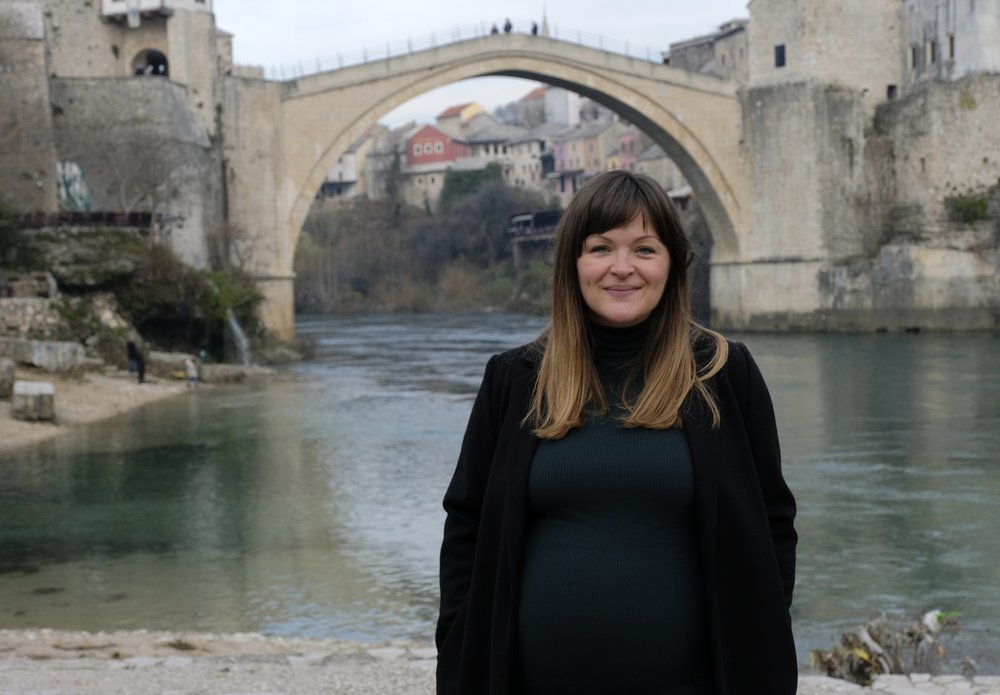Irma Baralija is looking forward to Sunday, when she intends to vote and hopes to win her race as the southern Bosnian city of Mostar holds its first local election in 12 years.
To make that vote possible in her hometown, the 36-year-old Baralija had to sue Bosnia in the European Court of Human Rights for letting a stalemate between two major nationalist political parties prevent her, along about 100,000 other Mostar residents, from voting or running in a municipal election for over a decade.
By winning in court in October 2019, Baralija believes she has “busted the myth (that nationalist parties) have been feeding to us, that an individual cannot move things forward, that we matter only as members of our ethnic groups.
Parties representing only one ethnic group have dominated Bosnian politics since the end of the country’s devastating 1992-95 war, which pitted its three main ethnic factions — Serbs, Croats and Muslims — against each other after the break-up of Yugoslavia.
“I hope that my example will inspire citizens of Mostar, when they vote on Sunday, to be brave, to realize that as individuals we can bring positive change,” said Baralija, who is running for a city council seat on the ticket of the small, multi-ethnic Our Party.
Divided between Muslim Bosniaks and Catholic Croats, who fought fiercely for control over the city during the 1990s conflict, Mostar has not held a local poll since 2008, when Bosnia’s constitutional court declared its election rules to be discriminatory and ordered that they be changed.
The dominant nationalist Bosniak and Croat political parties, the SDA and the HDZ respectively, have spent over a decade failing to agree about how to do that. Meanwhile, Mostar was run by a de facto acting mayor, HDZ’s Ljubo Beslic, and his office, which included SDA representatives, with no local council to oversee their work or the allocation of nearly 230 million euros from the city’s coffers they have spent over the years.
Left without fully functioning institutions, Mostar — one of the impoverished Balkan country’s main tourist destinations — has seen its infrastructure crumble, trash repeatedly pile up on its streets and hazardous waste and wastewater treatment sludge dumped in its only landfill, which was supposed to be for non-hazardous waste.
An agreement between the two parties, endorsed by the top European Union and U.S. diplomats in Bosnia, was finally reached in June — eight months after the court in Strasbourg had ruled in favor of Baralija and gave Bosnia six months to amend its election laws so a vote can be held in Mostar.
Mostar is divided in half by the Neretva River. During the war, Croats moved to the western side and Muslims to the east. Since the fighting stopped, the city has had two post offices, two electricity and water suppliers, two phone networks, two public hospitals and more — one crumbling set for each ethnic group.
On Sunday, several small, multi-ethnic parties will be vying for seats in the city council after campaigning on bread-and-butter issues. But the nationalist HDZ and SDA parties hope that, among them, they will secure a two-thirds majority in the council and keep their grip on power.
While acknowledging that the nationalists have armies of faithful voters whom they mobilize by stoking ethnic mistrust, non-nationalist election candidates in Mostar hope the past 12 years has shown that those two parties are too corrupt and incompetent.
“I think that many people finally realized that the abstract, ethnic interests are meaningless while their children are leaving (Mostar) in droves in search of decent jobs and a decent life” elsewhere in Europe, said Amna Popovac, a candidate from the multi-ethnic Platform for Progress party.
The nationalists are now promising to fix the city’s many problems as if “Martians and not they were running Mostar, unchecked, for the past 12 years,” she added.
Miljan Rupar’s name will also be on the ballot. The 35-year-old, who is running as a candidate from the multi-ethnic Social Democrat Party, decided to get involved in politics after realizing that over 38 friends and relatives, including his sister, had left Mostar “for good” in search of a better life abroad.
Rupar wants his city focused on the future, just like the international school where he teaches physics, the United World College branch in Mostar. The school is one of 17 around the globe and run by a movement founded in 1962 with the aim of overcoming Cold War divisions by bringing high-achieving youngsters from all over to live and learn together.
“When I walk into the classroom or attend our bi-weekly assembly and see students and teachers from all over the world, including from various parts of Bosnia-Herzegovina, who share the same values and goals, it gives me hope,” he said.
Political journalist Faruk Kajtaz, however, thinks that hope could prove to be treacherous in the divided city, despite local voters’ well-justified grievances. He notes that not just Mostar but all of Bosnia has long been politically and administratively fragmented along ethnic lines.
“Maybe too much is expected from the people of Mostar,” he said. “(But) just the fact that citizens of Mostar will finally get a chance to vote for their local legislators is in itself a big win for democracy.”
(AP)











